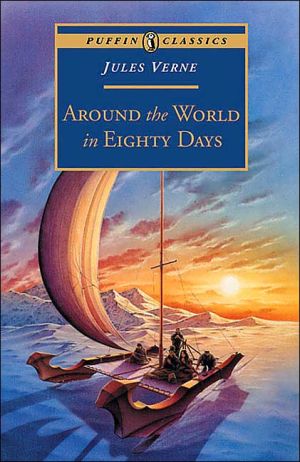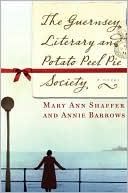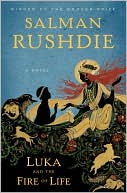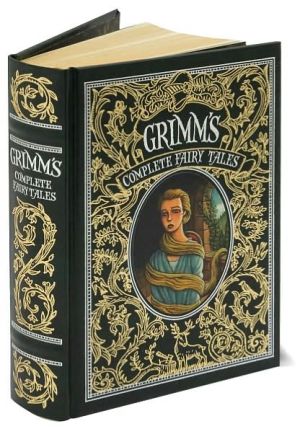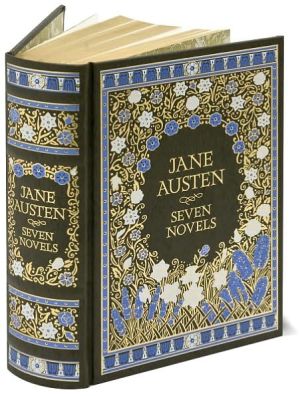Around the World in Eighty Days
A fastidious English gentleman makes a remarkable wager - he will travel around the world in eighty days or forfeit his life's savings. Thus begins Jules Verne's classic 1872 novel, which remains unsurpassed in sheer story-telling entertainment and pure adventure. Phileas Fogg and his faithful manservant, Jean Passepartout, embark on a fantastic journey into a world filled with danger and beauty - from the exotic shores of India, where the heroic travelers rescue a beautiful Raja's wife from...
Search in google:
On a wager, the eccentric English gentleman Phileas Fogg accepts a challenge to circle the globe in 80 days. Follow Phileas and his faithful valet, Passepartout, in this fantastic adventure. 1 MP3 CD.School Library JournalGr 3-5 - All three adaptations of these classic novels fall prey to the usual pitfalls involved in such a process. The bare outlines of the plots are provided, but character development, a true sense of place and time with regard to setting, and masterful description of the action all go by the wayside. Jungle Bookis mistitled as it references only the Mowgli stories and moves from incident to incident so quickly that the "law of the jungle" morals in Kipling's anthropomorphic fables are lost. Treasure Islandis written in a similar breakneck, choppy style, and Long John Silver, one of the most memorable characters ever created, is eminently forgettable in this telling. In 80 Days, the historic events that made such a journey even thinkable, like the opening of the Suez Canal and the completion of the Transcontinental Railroad, are never mentioned, nor is the International Date Line, which enabled Fogg to win his wager, mentioned, let alone explained. The cartoon illustrations in all three volumes border on offensive as no matter which country or culture is depicted, the dot-eyed faces are virtually identical except for minor variations in skin tone. Some illustrations make no sense, as when the action in 80 Daysdescribes the servant Passepartout at the bottom of a circus pyramid, but the picture is of a Japanese tearoom.-Grace Oliff, Ann Blanche Smith School, Hillsdale, NJCopyright 2007 Reed Business Information
Chapter one In in which Phileas Fogg and Passepartout accept each other, the one as master, the other as man\ Mr. Phileas Fogg lived, in 1872, at No. 7, Saville Row, Burlington Gardens, the house in which Sheridan died in 1814. He was one of the Most noticeable members of the Reform Club, though he seemed always to avoid attracting attention; an enigmatical personage, about whom little was known, except that he was a polished man of the world. People said that he resembled Byron-at least that his head was Byronic-, but he was a bearded, tranquil Byron, who might live on a thousand years without growing old.\ Certainly an Englishman it was more doubtful whether Phileas Fogg was a Londoner. He was never seen on 'Change, nor at the Bank, nor in the counting-rooms of the "City"; no ships ever came into London docks of which he was the owner; he had no public employment; he had never been entered at any of the Inns of Court, either at the Temple, or Lincoln's Inn, or Gray's Inn; nor had his voice ever resounded in the Court of Chancery, or in the Exchequer, or the Queen's Bench, or the Ecclesiastical Courts. He certainly was not a manufacturer; nor was he a merchant or a gentleman farmer. His name was strange to the scientific and learned societies, and he never was known to take part in the sage deliberations of the Royal Institution or the London Institution, the Artisan's Association or the Institution of Arts and Sciences. He belonged, in fact, to none of the numerous societies which swarm in the English capital, from the Harmonic to that of the Entomologists, founded mainly for the purpose of abolishing pernicious insects.\ Phileas Fogg was a member of theReform, and that was all.\ The way in which he got admission to this exclusive club was simple enough.\ He was recommended by the Barings, with whom he had an open credit. His checks were regularly paid at sight from his account current, which was always flush.\ Was Phileas Fogg rich? Undoubtedly. But those who knew him best could not imagine how he had made his fortune, and Mr. Fogg was the last person to whom to apply for the information. He was not lavish, nor, on the contrary, avaricious; for whenever he knew that money was needed for a noble, useful, or benevolent purpose, he supplied it quickly, and sometimes anonymously. He was, in short, the least communicative of men. He talked very little, and seemed all the more mysterious for his taciturn manner. His daily habits were quite open, to observation; but whatever he did was so exactly the same thing that he had always done before, that the wits of the curious were fairly puzzled.\ Had he travelled? It was likely, for no one seemed to know the world more familiarly; there was no spot so secluded that he did not appear to have an intimate acquaintance with it. He often corrected, with a few clear words, the thousand conjectures advanced by members of the club as to lost and unheard-of travellers, pointing out the true probabilities, and seeming as if gifted with a sort of second sight, so often did events Justify his predictions. He must have travelled everywhere, at least in the spirit.\ It was at least certain that Phileas Fogg had not absented himself from London for many years. Those who were honored by a better acquaintance with him than the rest, declared that nobody could pretend to have ever seen him anywhere else. His sole pastimes were reading the papers and playing whist. He often won at this game, which, as a silent one,, harmonized with his nature; but his winnings never went into his purse, being reserved as a fund for his charities. Mr. Fogg played, not to win, but for the sake of playing. The game was in his eyes a contest, a struggle with a difficulty, yet a motionless, unwearying struggle, congenial to his tastes.\ Phileas Fogg was not known to have either wife or children, which may happen to the most honest people; either relatives or near friends, which is certainly more unusual. He lived alone in his house in Saville Row, whither none penetrated. A single domestic sufficed to serve him. He breakfasted and dined at the club, at hours mathematically fixed, in the same room, at the same table, never taking his meals with other members, much less bringing a guest with him; and went home at exactly midnight, only to retire at once to bed. He never used the cozy chambers which the Reform provides for its favored members. He passed ten hours out of the twentyfour in Saville Row, either in sleeping or making his toilet. When he chose to take a walk, it was with a regular step in the entrance hall with its mosaic flooring, or in the circular gallery with its dome supported by twenty red porphyry Ionic columns, and illumined by blue painted windows. When he breakfasted or dined, all the resources of the club-its kitchens and pantries, its buttery and dairy—aided to crowd his table with their most succulent stores; he was served by the gravest waiters, in dress coats, and shoes with swan-skin soles, who proffered the viands, in special porcelain, and on the finest linen; club decanters, of a lost mould, contained his sherry, his port, and his cinnamon-spiced claret; while his beverages were refreshingly cooled with ice, brought at great cost from the American lakes.\ If to live in this style is to be eccentric, it must be confessed that there is something good in eccentricity!\ The mansion in Saville Row, though not sumptuous, was exceedingly comfortable. The habits of its occupant were such as to demand but little from the sole domestic; but Phileas Fogg required him to be almost superhumanly prompt and regular.
Notes to the Teacher 4Facts About the Author 5Facts About the Times 6Facts About the Characters 6Chapter Summaries 7Answer Key 10Literary Glossary 12Chapter ExercisesWords and Meanings, Ch. 1 14Recalling Details, Ch. 1 15Synonyms and Antonyms, Ch. 1 16Words and Meanings, Ch. 2 17Cause and Effect, Ch. 2 18Words and Meanings, Ch. 3 19Sequence of Events, Ch. 3 20Words and Meanings, Ch. 4 21Comprehension Check, Ch. 4 22Inference, Ch. 4 23Words and Meanings, Ch. 5 24Recalling Details, Ch. 5 25Words and Meanings, Ch. 6 26Sequence of Events, Ch. 6 27Character Study, Ch. 6 28Words and Meanings, Ch. 7 29Cause and Effect, Ch. 7 30Words and Meanings, Ch. 8 31Comprehension Check, Ch. 8 32Words and Meanings, Ch. 9 33Comprehension Check, Ch. 9 34Words and Meanings, Ch. 10 35Sequence of Events, Ch. 10 36Personalizing Story Events, Ch. 10 37End-of-Book ExercisesBook Sequence 38Final Exam, Part 1 39Final Exam, Part 2 40Universal ExercisesBeyond the Text 41Plot Study 42Theme Analysis 43Character Study 44Vocabulary Study 45Glossary Study 46Book Review, Part 1 47Book Review, Part 2 48
\ School Library JournalGr 3-5 - All three adaptations of these classic novels fall prey to the usual pitfalls involved in such a process. The bare outlines of the plots are provided, but character development, a true sense of place and time with regard to setting, and masterful description of the action all go by the wayside. Jungle Bookis mistitled as it references only the Mowgli stories and moves from incident to incident so quickly that the "law of the jungle" morals in Kipling's anthropomorphic fables are lost. Treasure Islandis written in a similar breakneck, choppy style, and Long John Silver, one of the most memorable characters ever created, is eminently forgettable in this telling. In 80 Days, the historic events that made such a journey even thinkable, like the opening of the Suez Canal and the completion of the Transcontinental Railroad, are never mentioned, nor is the International Date Line, which enabled Fogg to win his wager, mentioned, let alone explained. The cartoon illustrations in all three volumes border on offensive as no matter which country or culture is depicted, the dot-eyed faces are virtually identical except for minor variations in skin tone. Some illustrations make no sense, as when the action in 80 Daysdescribes the servant Passepartout at the bottom of a circus pyramid, but the picture is of a Japanese tearoom.-Grace Oliff, Ann Blanche Smith School, Hillsdale, NJ\ Copyright 2007 Reed Business Information\ \ \ \ \ From the Publisher"A spectacular edition of Jules Verne's classic tale of travel and adventure." — Edmonton's Child's\ \ \
